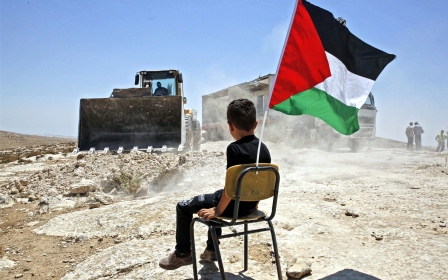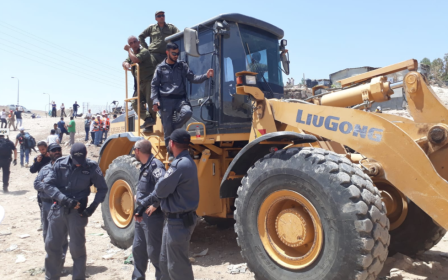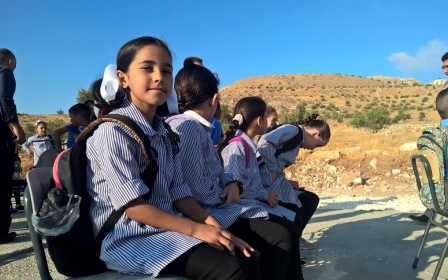For Palestinians, Israeli High Court is a legal fig leaf for home demolitions
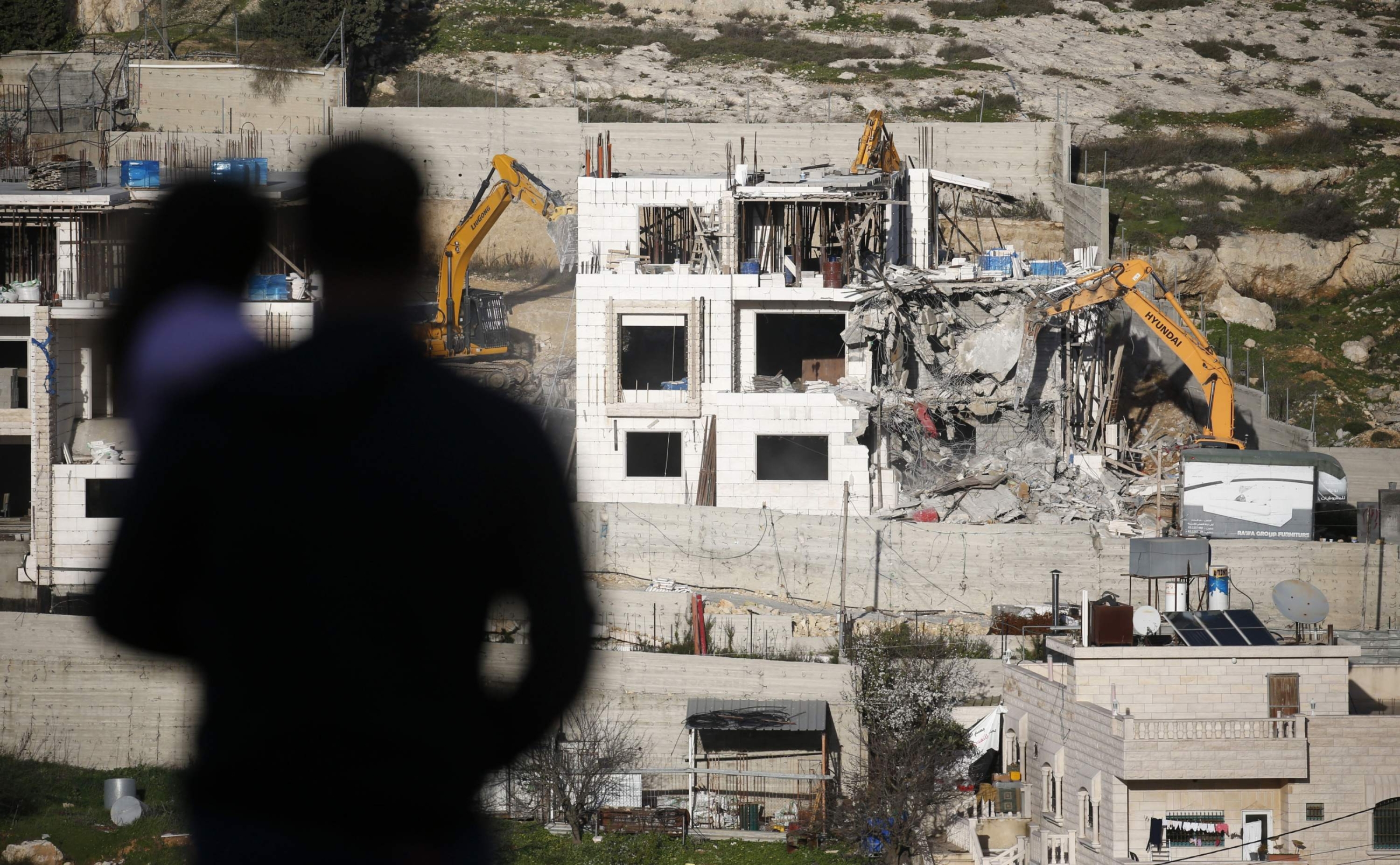
Lying back on a mattress on the ground, Abu Imad soaks up the midday sun.
As he smokes a cigarette in front of the welcome tent of his village, Abu Nuwar, he can see the rocky hills roll down and then up again to the Israeli settlement of Kedar.
In spite of his demeanour, it is hard to imagine how the head of Abu Nuwar could be relaxed while the village is under constant threat of demolition by Israeli authorities.
Since 2005, the village has filled over 250 petitions to the Israeli High Court against planned home demolitions and confiscation of property and land to make way for illegal settlements.
While it is the highest Israeli legal institution that could rule on the fate of the village, Abu Imad believes the court is part and parcel of the Israeli occupation.
Stay informed with MEE's newsletters
Sign up to get the latest alerts, insights and analysis, starting with Turkey Unpacked
“It’s not an honest game,” Abu Imad told Middle East Eye.
While a high court in any democracy should act separately and independently from the government, a new report by Israeli human rights NGO B’Tselem accuses the Israeli High Court of continually acting as an arm of the state to justify Israel’s policy of home demolitions.
Released on Wednesday, the report - entitled Fake Justice - outlines the responsibility of the court’s justices in the demolitions of Palestinian property in the occupied Palestinian territory.
“The court… provides an implicit legal stamp of approval to the Israeli policy,” the report stated, adding that by doing so, it legitimised Israel’s policy of settlement expansion in the West Bank and restricted the growth of Palestinians.
Fighting demolition orders
The High Court is a familiar place for the residents of Abu Nuwar.
In November 2017, the High Court granted the community permission to add two new classrooms to their school, Abu Imad explained. Of Abu Nuwar’s 650 residents, half of them are children and youth.
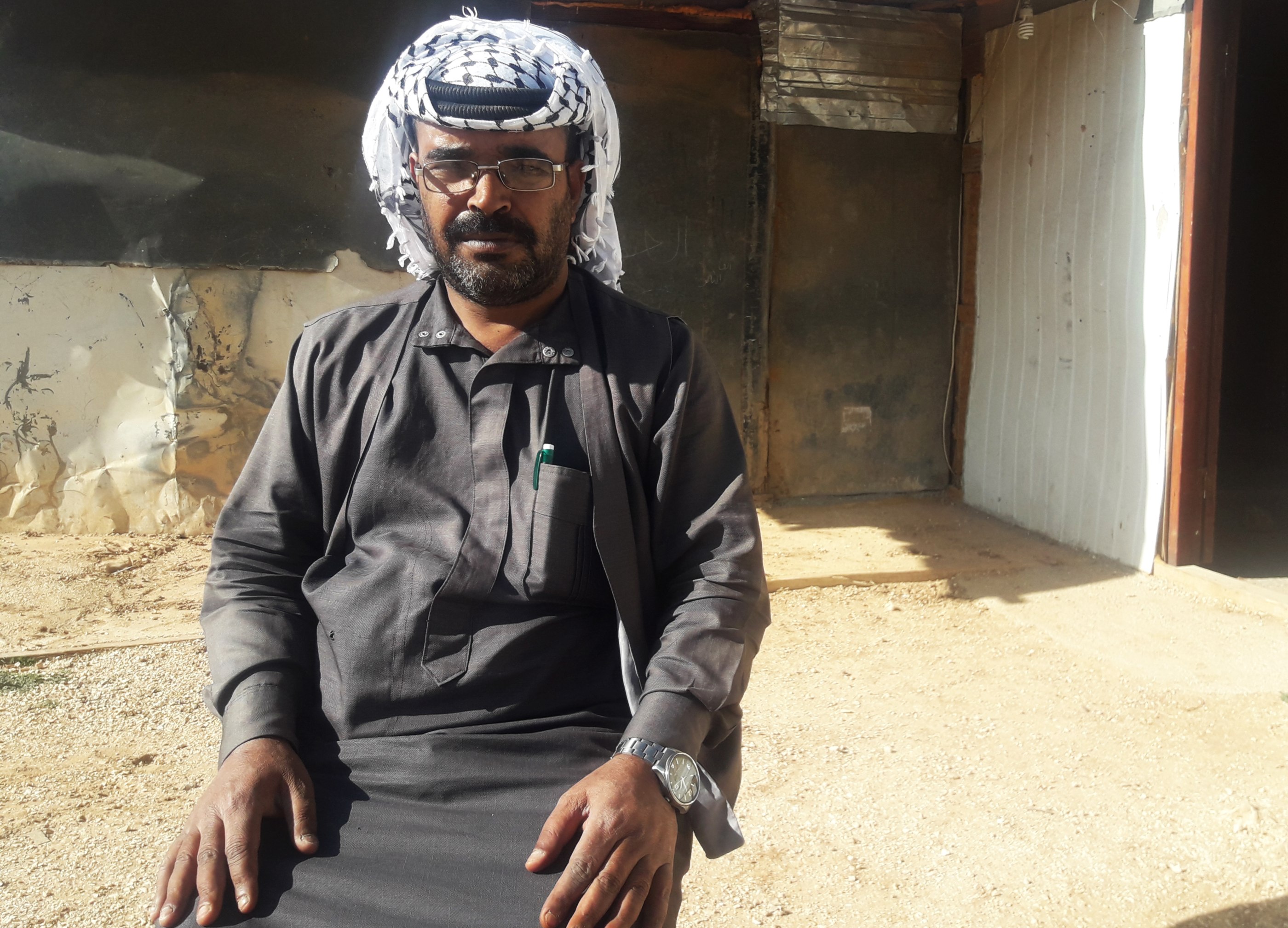
The ruling further stated that the Civil Administration - the misleadingly named Israeli military body tasked with governance of the occupied West Bank - was not allowed to demolish structures in Abu Nuwar without giving the community one month's notice.
A mere month later, on 13 December 2017, the Civil Administration issued a demolition order against the school, saying Abu Nuwar residents had 72 hours to dismantle the building - or Israeli authorities would demolish it themselves and bill the village for the expense.
“Even with the High Court decision [allowing us to build new rooms], the Civil Administration came and destroyed the classroom,” Abu Imad said.
On 4 July 2018, the Civil Administration - which is more commonly known as the Coordinator of Government Activities in the Territories (COGAT) - further demolished nine homes and three structures for animals in the village, leaving 62 people homeless without warning.
Abu Imad said the High Court ruled in favour of his village because it was aware of the international scrutiny surrounding evictions of Bedouin communities in the West Bank - particularly regarding the case of Khan al-Ahmar.
“In the media, it’s good to show that the High Court took the decision to save this community,” Abu Imad said. “They want to show the international community that Israel is a democratic state, that there are independent bodies.”
He believes this is why the High Court grants Palestinians permission to build schools, and rules that residents must be given ample warning before demolitions.
“The Civil Administration knows the game and that the decision of the High Court is not serious, so they came and destroyed the structure,” Abu Imad continued.
“The High Court is the body of the occupation.”
Planning policy as a tool in court
For Palestinians like the residents of Abu Nuwar living in Area C, the 60 percent of the West Bank under full Israeli army control, Israel’s planning policy in the occupied territory has been a tool of constant discrimination.
“The planning apparatus Israel has instituted in the West Bank serves its policy of promoting and expanding Israeli takeover of land across the West Bank,” the B’Tselem report stated.
B’Tselem outlined in the report the Israeli prohibitions on Palestinian construction in Area C.
Israel changed the Jordanian Planning Law, which applied to the West Bank before Israel occupied the area in 1967, by issuing a military order which transferred complete planning authority to COGAT’s supreme planning council, subsequently removing any Palestinian representation or interests.
According to the NGO, Palestinians filed 5,475 applications for building permits to COGAT between January 2000 and mid-2016 - but only only 226 were approved.
This leaves Palestinians reluctant to even apply for the costly permits in the first place.
“We don’t go to the planning committee before building, because we know they will reject our permits,” Abu Imad explained.
“We need roads and electricity and proper housing, but we’re not allowed to build them,” he said, with the Maale Adumim settlement bloc standing out in the background.
Between 2006 and 2018, Israel demolished 1, 401 Palestinian homes in Area C, leaving 6,207 people, half of them minors, homeless.
The High Court is the body of the occupation
- Abu Imad, resident of Abu Nuwar
The vast majority of demolitions were carried out on the grounds that the houses were built without permits.
Out of hundreds of petitions filed to the High Court against demolitions over the years, most are denied based on Israel’s planning policy.
“The [High Court] justices have regarded Israeli planning policy as lawful and legitimate, nearly always focusing only on the technical issue of whether the petitioners had building permits,” B’Tselem wrote.
In the majority of cases, the High Court issued interim injunctions prohibiting Israel to demolish the structures pending a ruling.
This perpetuated the High Court’s appearance of upholding the rule of law, though it only left “Palestinians to a prolonged state of limbo and uncertainty as to their future,” B’Tselem highlighted.
B’Tselem executive director Hagai El-Ad said the life of Palestinian communities were frozen by such legal battles.
“They don’t know what their future will be… it leaves people with a growing sense of despair,” El-Ad told Middle East Eye.
While Palestinians are boxed into outdated planning zones, Israeli settlements - which are illegal under international law - expand unrestricted.
The report stated that the High Court had “fully embraced this point of view”.
Violation of international law
B’Tselem attorney Yael Stein told Middle East Eye it wasn’t the role of the courts to “tick the box” as to whether Palestinians have permits or not.
“It’s shocking to see the elasticity of their [the High Court judges’] thinking, they can do whatever they want with their reality.”
“The High Court should look at international law and outline that the occupied population needs to be granted certain rights, so this planning policy is illegal,” Stein said.
The B’Tselem report accused the High Court of blatant disregard of Israel’s violation of international humanitarian law through its forcible transfer of civilian populations.
The squeezing of communities through the restriction of real estate development to meet their needs, in addition to the demolition of homes, forces Palestinians to leave their land.
These violations, upheld by the High Court, constitute a war crime, B’Tselem said.
The court, it said, has the “authority and the duty to find Israel’s policy unlawful and prohibit the demolition of homes”.
Only solution is being creative
Given its paltry record, some Palestinians have argued in favour of completely ceasing to engage with the High Court.
However, Abu Imad believes this would only give Israel complete power to destroy the entire community of Abu Nuwar.
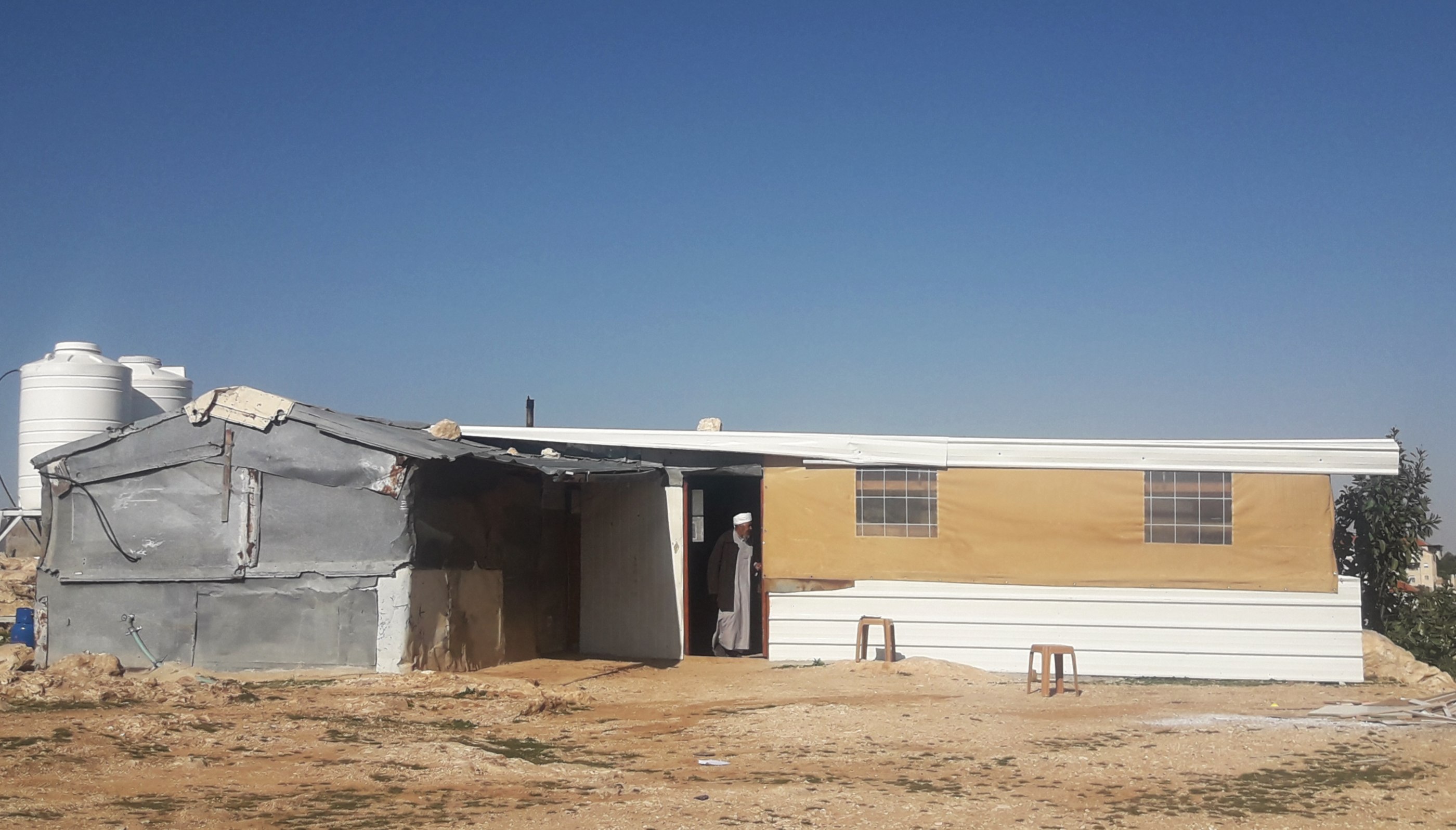
“I can’t stop dealing with the High Court, because there is no other solution, no alternative,” Abu Imad said, laughing at the absurdity of the situation.
Today, there are no pending demolition orders against Abu Nuwar - but the community spends each day worrying that another one will arrive.
Faced with seemingly inescapable Israeli restrictions, residents of Abu Nuwar have had to get creative.
Traditionally, Palestinians will, upon getting married, build the newlywed couple’s new residence above or beside the husband’s family’s home.
“If we can’t add any structures for the new generation, the family divides the existing home in two parts, and the new family live in one half, side by side,” Abu Imad described.
Since the demolition of Abu Nuwar’s classrooms, students have been taught in the communal tent where the village normally greet visitors.
“We find alternatives.”
Middle East Eye delivers independent and unrivalled coverage and analysis of the Middle East, North Africa and beyond. To learn more about republishing this content and the associated fees, please fill out this form. More about MEE can be found here.


